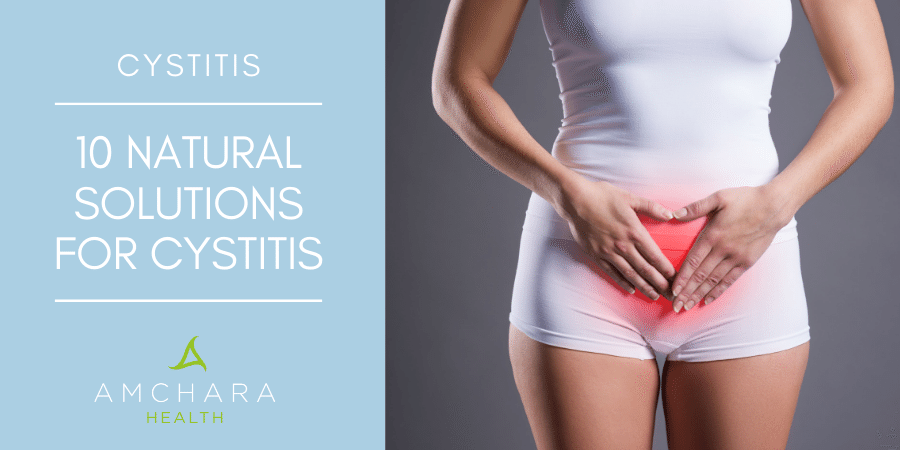Topics covered in this article:
Cystitis, technically known as a urinary tract infection, is a common condition, particularly in women.
It is estimated that around 50% of women experience a bout of cystitis at some point in their lives (1).
There are a variety of reasons why cystitis occurs, and common treatment includes antibiotics.
We always take an evidence-based approach and in this article we take a look at factors involved and natural solutions for preventing and dealing with a bout of cystitis.
What is cystitis?
Cystitis literally means inflammation of the bladder.
It is characterised by pain and a burning sensation when urinating and a frequent and urgent need to pass small volumes of urine. Urine may be cloudy, dark coloured or strong smelling.
In addition to this there may be general feelings of being unwell, run down or fatigued.
What causes cystitis?
It is usually caused by a bacterial infection, and up to 80% of cases arise from E. coli bacteria, normally found in the gut.
These bacteria are usually introduced into the bladder through:
- poor personal hygiene
- sexual intercourse
- having a urinary catheter
- certain contraceptive methods such as a diaphragm
An increase in cystitis may be seen in people with a lowered immunity, during pregnancy, following menopause, after several courses of antibiotics, in diabetes and with structural issues involving the urethra.
Interstitial cystitis, also called painful bladder syndrome, does not involve bacterial infection but also causes pain, frequent urination or a strong urge to urinate.
This article will focus on cystitis caused by a bacterial infection.
Natural solutions for cystitis
Whether you are tackling a current bout of cystitis or looking to prevent recurrence, taking the following steps may be useful.
1. Drink plenty of fluids – avoid alcohol, tea, coffee and other caffeinated drinks and opt for fresh water, herbal teas, redbush tea or coffee alternatives. These help to maintain fluid balance and flush bacteria out of the bladder.
2. Eat more alkaline food – this helps to keep the urine more alkaline and may discourage unwanted bacteria from becoming a problem. Increase fresh fruits and vegetables, including dark green leafy vegetables, peppers, broccoli and avocado. Aim for 8-10 portions of fruit and vegetables a day with an emphasis on vegetables. Keep meat, eggs and dairy intake low as these may have the opposite effect.
3. Avoid sugar – a high glucose concentration in the urine can be used as a food source for bacteria, allowing them to flourish. This may be one of the reasons why there is a higher incidence of cystitis in people with poor blood sugar control, such as in diabetes (2). Be aware of hidden sugar in foods, always read food labels and avoid adding natural sugar alternatives as these also feed the bacteria.
4. Include plenty of probiotic foods – such as fermented foods including sauerkraut, kimchi, tempeh and kombucha. These are rich in beneficial bacteria that not only support the health of the gut but also the balance of the eco-system within the vagina and urinary tract (3).
5. Choose specific probiotic supplements – certain strains of probiotics may be more beneficial than others. Some of the most beneficial for prevention of recurrence of cystitis include Lactobacillus rhamnosus GR-1 and Lactobacillus reuteri RC-14 (4).
6. Increase cranberry – drinking unsweetened cranberry juice or using a supplement may help to encourage unwanted bacteria to slide out of the bladder (5).
7. Take D-mannose – this is a simple sugar related to glucose and may work in a similar way to cranberry (6). It may be of use for current infection or prevention (7).
8. Use natural antibacterials – commonly used antibiotics for cystitis also affect the delicate balance of the microbiome in the gut. This may adversely affect immune functioning. Natural antibacterials may not be as disruptive to the gut microbiome whilst still being effective against the bacteria causing cystitis. Useful natural antibacterials for a bout of cystitis include grapefruit seed extract (8), garlic (9) and silver (10).
9. Support the immune system – increasing the intake of certain vitamins, minerals and herbs may allow the immune system to deal more effectively with an infection. Specific nutrients to focus on include vitamin C and zinc. Increase foods such as peppers, broccoli, guava, kiwi, pumpkin seeds and shellfish. The herb echinacea has been used traditionally for immune support and is known to have antimicrobial activity (11).
10. Make lifestyle alterations – changing certain habits can discourage the introduction or growth of the bacteria that are linked to cystitis. Try the following:
- Pay attention to personal hygiene, always wiping your bottom from front to back when you go to the toilet
- Wash after sexual intercourse
- Always fully empty the bladder when urinating, especially after intercourse
- Do not use soaps, detergents or perfumed toiletries
- Avoid nylon underwear or tight trousers and use cotton underwear
- Manage stress – chronic stress may impact the immune system.
With such a high chance of developing cystitis there are many measures that can be taken to ensure this risk is reduced.
Making simple nutritional and lifestyle changes can significantly benefit the health of the urinary tract.
We’re dedicated to providing you with both insightful information and evidence-based content, with actionable knowledge and tips to help you on your journey to optimal health.
Did you find this article useful?
We’d love to hear your thoughts, get in touch!
READ THIS NEXT:




